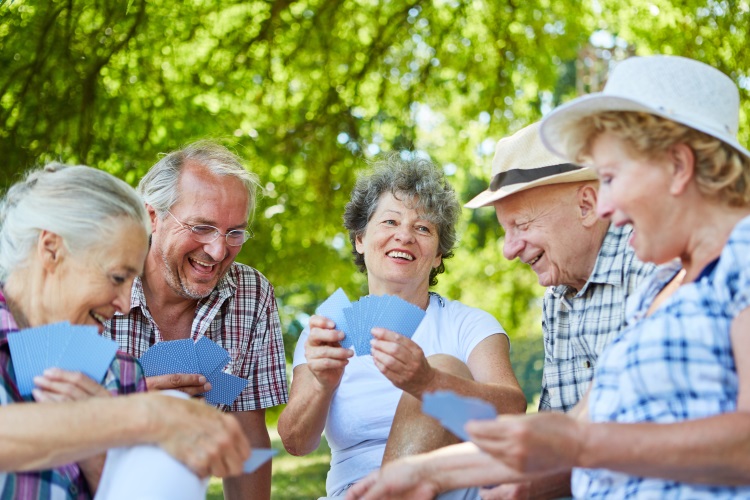Brain Stimulating Activities for the Elderly

As we age, keeping our brains active becomes increasingly important for maintaining cognitive health and function. Engaging in brain-stimulating activities can significantly enhance the connections between brain cells, helping elderly individuals retain their mental faculties longer. Whether it is at home or at a long-term care facility, understanding and implementing ways to keep seniors mentally engaged is crucial. Staff and caregivers have ample opportunities to promote cognitive activities, fostering satisfaction and success, which offer many health benefits.
Whether participating in gentle exercises or memory-boosting games, these activities not only promote well-being but also strengthen bonds between older adults and their loved ones. For seniors, especially those with dementia, these activities can reduce anxiety and provide reassurance, focusing on the joy of the activity rather than the outcome. Incorporating mental stimulation into daily routines not only brightens their days but also supports a sharper, healthier mind, enhancing overall quality of life. 1,2
5 Types of Activities for Stimulating the Brain
Below are 5 types of activities that can help keep your loved one’s mind sharp and provide additional health benefits.
Puzzles and Games
Crossword puzzles and Sudoku are excellent brain-stimulating activities for seniors, offering both fun and cognitive benefits. These brain games stretch the mind, enhancing memory, word recall, and overall mental function. Whether it’s a daily crossword from the newspaper or a Sudoku book with larger print and simpler vocabulary, these word games keep seniors entertained and mentally active. For those who previously enjoyed more complex wordplay, finding appropriately challenging puzzles can still provide a sense of accomplishment and mental engagement.2,3
Board games and card games offer fantastic opportunities for mental stimulation in seniors, engaging their brains in a fun and interactive way. Simple games like Poker, Solitaire, Go Fish, and Memory Match can significantly improve cognitive functions such as memory retention and logical problem-solving skills. It’s essential to choose games that match your loved one’s abilities to prevent frustration and encourage full engagement. Opt for playing board games with simpler rules or those designed for children if needed, allowing for creativity and enjoyment rather than strict adherence to the rules. 3
Learning New Skills
Learning to play a musical instrument can be incredibly therapeutic for seniors, benefiting both the brain and the body. Whether it’s a skill they’ve had for years, or they are complete beginners, playing an instrument provides challenges to mental and physical dexterity that strengthen neural pathways. This activity offers numerous cognitive advantages, such as enhancing intelligence, memory, and overall brain health. Regular musical engagement also improves sleep, reduces pain and blood pressure, and alleviates symptoms of conditions like Alzheimer’s. Encouraging your loved one to learn an instrument can sharpen social skills, provide a sense of accomplishment, and promote mental well-being. 1,4
Learning a new language is an excellent exercise for a senior’s brain, much like playing a musical instrument. This activity improves concentration and memory while forging new mental connections. Although learning a new language can become more challenging with age, it remains a brilliant way to keep the mind sharp. This can be helpful for refreshing previously learned language skills or acquiring a new one. Whether you’re revisiting a long-forgotten language or starting from scratch, there are countless online resources that make the process both enjoyable and engaging. 1,2
Physical Activities
Walking and dancing are excellent brain-stimulating activities for seniors, offering numerous health benefits beyond physical fitness. According to the CDC, regular physical activity like these can reduce cognitive decline. Seniors can enhance their memory and overall cognitive health by incorporating exercises such as walking and dancing into their routine. These activities, akin to mental workouts, help keep the brain engaged and healthy. In addition to physical benefits, exercise releases endorphins, improving mood, vitality, alertness, and overall well-being. For seniors with limited mobility, adapting activities to their abilities is crucial, ensuring they remain active and mentally stimulated. 2,3
Yoga and Tai Chi are excellent for enhancing seniors’ brain and body health through regular, light-to-moderate exercise. These activities promote blood flow to the brain, facilitate lymph fluid movement, and require balance and coordination, stimulating various brain regions. Regular participation in yoga and Tai Chi can significantly reduce the likelihood of developing dementia by keeping the brain active. Additionally, joining yoga or Tai Chi classes offers social benefits, leading to stimulating conversations and greater happiness. 1,4
Any physical activities or exercises should be recommended and approved by your primary care physician, family physician, or other appropriate clinicians to ensure safety and address any health concerns.
Creative Activities
Painting and drawing are excellent for seniors’ brain health, engaging multiple brain systems such as cognitive, emotional, sensory, and motor capacities. These activities improve brain connections and foster cognitive abilities while being enjoyable and relaxing. Joining an art class or drawing group enhances mental stimulation and provides social interaction. Additionally, crafts like knitting, crocheting, and woodworking engage both creative and logical brain functions, promoting overall cognitive well-being. Embracing any form of art or crafting keeps the mind active and healthy.2,4
Writing is a fantastic brain exercise for seniors, offering cognitive benefits and enjoyment. Activities like journaling help organize thoughts and remember daily events, while creative writing, such as stories or poems, stimulates the brain. Seniors can also explore informative blogging or other creative writing forms. Joining a writing group or class can enhance social interaction and provide a structured way to learn this new skill. Writing not only boosts memory and cognitive abilities but also allows for emotional expression, making it a valuable hobby for brain health. 2,4
Social Engagement
Group activities and clubs are excellent for seniors’ brain health, providing both social interaction and mental stimulation. Socializing requires listening, processing information, and navigating communication barriers, all of which keep the brain active. Seniors should try to socialize frequently, whether with friends, family, or by joining clubs like cooking, gardening, or book clubs. For seniors who spend much of their day alone, having regular chats can significantly improve their sense of connection and well-being. Discussing their life experiences and encouraging conversation can be deeply enriching, helping them feel part of society and keeping their minds engaged. 3,4
Volunteering offers seniors valuable mental stimulation and a sense of fulfillment by engaging in new challenges and making a difference in their community. It introduces new situations and social interactions, keeping the brain active and engaged. Through volunteering, seniors can experience the joy of contributing to meaningful causes while enhancing their cognitive health and overall well-being. 2
Final Thoughts
Hopefully, this list of brain-stimulating activities for elders has provided some helpful ideas. Engaging in activities like puzzles, games, learning new skills, physical exercises, creative pursuits, social engagement, and volunteering helps enhance brain cell connections and preserves mental faculties. Whether at home or in care facilities, promoting cognitive activities is essential for overall health. These activities not only boost cognitive functions but also improve mood, social interaction, and emotional well-being, making them vital for a higher quality of life in elderly individuals.
References
[1] Smith , Zenya. “Brain-Stimulating Activities for Elderly Loved Ones.” Elder, 6 Dec. 2023, www.elder.org/care-guides/24-hours-of-care-at-home/best-brain-stimulating-activities-elderly/.
[2] Newman, Grace. “14 Great Tips for Mental Stimulation for Seniors in Home Care.” Pacific Angels Home Care, 6 June 2023, www.pacificangelshomecare.com/blog/mental-stimulation-for-seniors/.
[3] THOMAS MSN, RN, JANELLE. “7 Mind Stimulating Activities & Cognitive Games for Seniors.” 7, Care Options For Kids LLC, 29 Jan. 2024, careoptionsforkids.com/blog/activities-for-the-mind.
[4] “10 Best Brain Exercises for Seniors.” Freedom Care, 17 Mar. 2023, freedomcare.com/brain-exercises-for-seniors/.
The information provided in the article is for general informational purposes only. This information is not a substitute for medical advice. Accordingly, before taking any actions based upon such information, you are encouraged to consult with the appropriate professionals.



